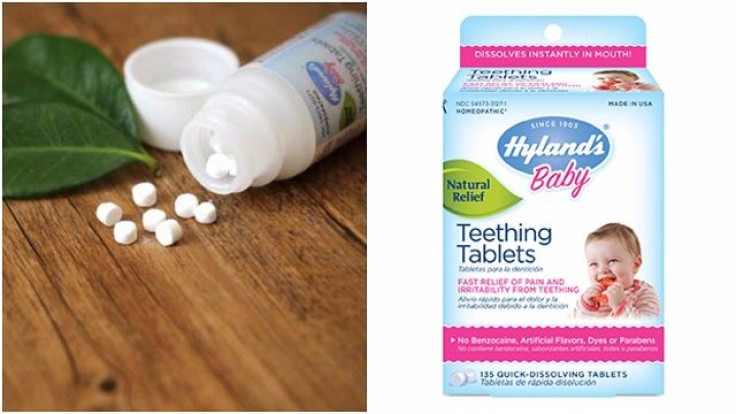Homeopathic Teething Tablets Contain A Toxic Ingredient Linked To 400 Injuries, 10 Deaths; FDA Warns Parents During Investigation
A line of products generally regarded as biologically inert may actually be connected to 10 child deaths, and serious health problems including muscle weakness and difficulty breathing, the Food and Drug Administration (FDA) has warned.
As previously reported by Medical Daily, the FDA issued a safety alert concerning homeopathic teething tablets and gels late last September. The alert cited a number of health risks linked to their use, a list that included seizures, difficulty breathing, and muscle weakness. Earlier this week, Buzzfeed News reported that the agency had examined more than 400 adverse event reports connected to the products in the last six years.
“We are also aware of reports of 10 deaths during that time period that reference homeopathic teething products, though the relationship of these deaths to the homeopathic teething products has not yet been determined and is currently under review,” said FDA spokesperson Lyndsay Meyer to Medical Daily.

Since the warning was released, CVS has removed all such products from their shelves, Meyers added. And Walgreens has followed suit, according to CNN. Hyland’s, a long-time distributor of homeopathic remedies, initially expressed surprise at the alert, denying their store brand teething products presented any danger to infants and young children. While still claiming their products were safe, the company announced earlier this Tuesday they would discontinue them in the United States.
“This decision was made in light of the recent warning issued by FDA against the use of homeopathic teething tablets and gels,” Hyland’s statement read. “This warning has created confusion among parents and limited access to the medicines.”
The warning comes in light of an earlier advisory issued by the agency in 2010, one that specifically tied instances of harm to Hyland’s teething products. The advisory focused on the products' inclusion of belladonna as an active ingredient, a plant once commonly used as a makeshift muscle relaxant but which can be toxic and deadly in high enough doses. The reports of injury the FDA is now looking at have all occured following the voluntary recall prompted by the 2010 advisory.
"Our preliminary review shows that these adverse events are similar to those observed in 2010," said Meyers.
The FDA’s latest action was spurred by a report of seizure received early last September. Currently, however, the agency is unable to disclose whether any other products have been suspected of causing harm.
“At this time, the FDA is still conducting our investigation, and we have not yet completed the analyses of products to determine if there is an association between the adverse events and the homeopathic teething products,” Meyers said, adding there is no timeline as to when the FDA’s findings will be made public.
Though homeopathic remedies are widely considered by many medical organizations to have no active ingredients, due to how heavily diluted they are, research has shown that many treatments, along with herbal and dietary supplements, are improperly produced and oftentimes contain amounts of an ingredient that vary drastically from bottle to bottle.
In 2015, a Texas mom stepped forward and claimed Hyland’s teething tablets had caused her daughter to develop seizures.



























